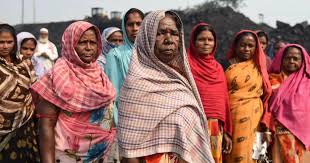Population expansion: The silent burden on India’s women.
With a population of 1.45 billion, India overtook China in 2023 to become the most populous country in the world.
Yet, paradoxically, there is a growing clamour in the country to have more children. The chief of the Rashtriya Swayamsewak Sangh has asked couples to have at least three children. He is not the only one. The Chief Ministers of Andhra Pradesh (AP) and Tamil Nadu (TN) are also urging the people of their states to increase their family size.
One of the reasons given for such demands is the declining fertility rate, especially in AP and TN. The total fertility rate (TFR) is below the replacement level of two births per woman in both of these southern states.
After decades of pushing for two children or less, mostly through coercive family planning policies targeting women, now that the goal to achieve the desirable TFR has been achieved in 17 of the 29 states, why is it no longer desirable?
For AP and TN, it is fear of losing out on parliamentary seats and political clout.
In 1976, the parliamentary seat share of every state was frozen for 25 years based on their 1971 population.
This was to assure them that if their population decreased as a consequence of implementing policies to bring down the population, their quota of parliamentary seats would not change.
In 2001, when this seat share policy was due for review, a decision to continue with the same number of seats irrespective of the state population for another 25 years was taken.
Since the past year, there have been signals that this is about to change next year (2026) when it is due to be reviewed. With population-based delimitation, the parliamentary seats of AP and TN will fall sharply. The populous northern states which have not performed as well in slowing population growth will benefit at the cost of the southern states which have done well to bring down their TFR.
This, it has been said, would be against the spirit of federalism. In all these arguments, not once has there been any mention of what impact this would have on women, although they are the ones who are central to population policies.
Even when the two-child policy was introduced in 1992, allowing only those with two or less children to contest panchayat and local urban body polls, no thought was given to the reproductive and human rights of women. If women were candidates and had more than two children, they had to abort or give up their child. If they were spouses of contestants, they faced forced abortion or abandonment. They suffered in both situations. There are many examples and studies to show that the two-child norm benefits and strengthens traditional structures of patriarchy.
Yet, it continues in several states in the name of population ‘control’. Now that some political decision-makers want an increase in population, some states are likely to follow AP, which has recently done away with the two-child norm. But will women benefit from this decision? Female foeticide and son preference remain a grim reality despite laws.
Last month, the Haryana Government announced the setting up of dedicated police cells in each district to deter sex-selective abortions and violations of the Pre-Natal Diagnostic Techniques (PNDT) Act in response to the declining sex ratio skewed against girls.
Worryingly, it is not just in Haryana where the female child is killed in the womb. Who can guarantee that encouraging the birth of more children will not lead to greater violations of women’s reproductive and sexual health and rights?
Why should the reproductive rights of women be up for negotiation when it is they who have the right to decide why, when and how many children they want?
